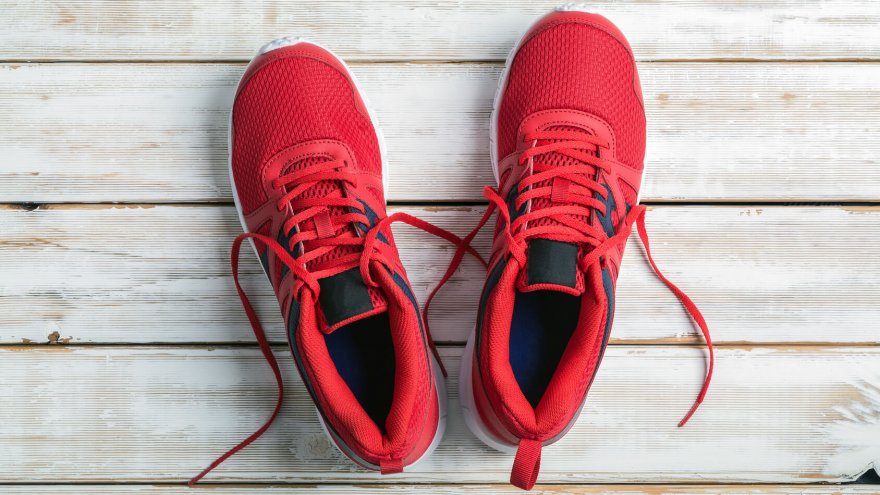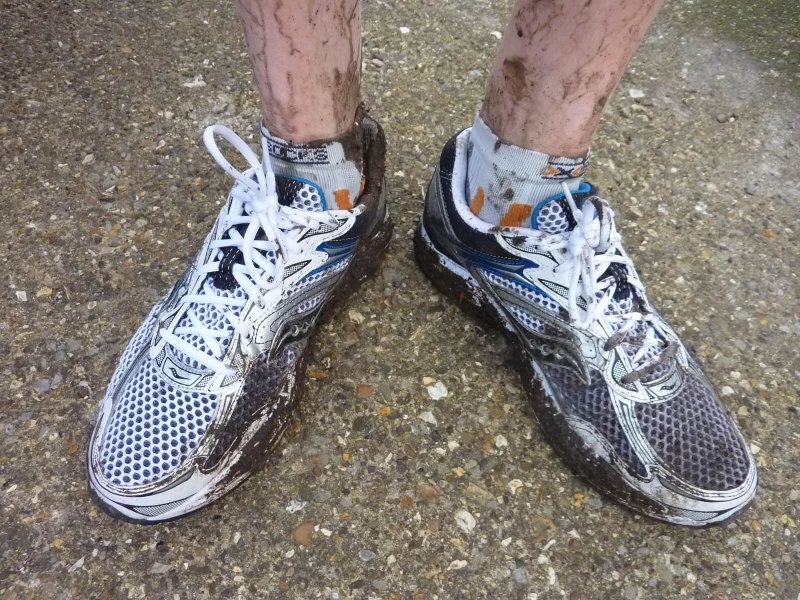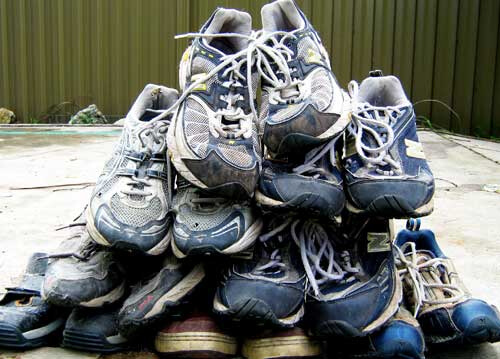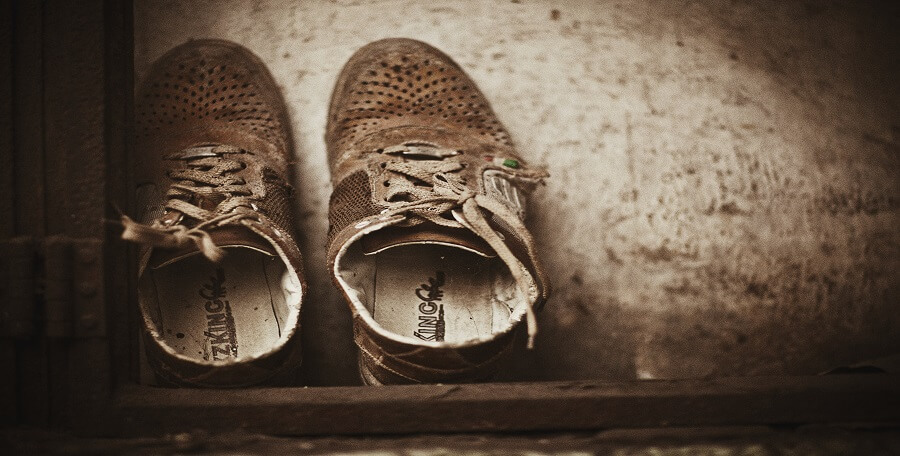How Long Do Running Shoes Last?

New runners often find themselves contemplating how long do running shoes last. It is not a black and white answer. There are so many more questions that need to be answered to arrive at how long your running shoes will last.
First things first. A quality pair of running shoes are sure to last you a little longer than a lesser known brand. There are some things you can skimp on. Quality shoes should not be one of those things.
Another thing to consider is if you are prone to injury. Some injuries, such as shin splints and foot issues, are more likely to occur if you continue running in old shoes that have broken down over time.
When asking when to replace running shoes, the last thing that bears mention is that these are guidelines and that everyone is different. I have a friend who can put over 1,000 miles on one pair of shoes. Is he the norm? Nope. But he does exist and can run a pair of shoes until they literally fall apart without getting injured.
How Long Do Running Shoes Last?
For the average recreational runner who runs 12-15 miles a week, a pair of running shoes will last anywhere from 6-8 months. How do you figure that out? Well, looking at the number of miles that most runners get out of a pair of shoes comes into estimating this statistic.

If you run 20 miles a week that means your shoes will last four to six months, so you will need two or three new pairs of shoes each year!
Tracking Mileage
A good rule of thumb is to replace a pair of running shoes anywhere between 350-500 miles (or 500 – 750 kilometers). There are apps that track your runs that also allow you to specify which pair of shoes you are wearing specifically for this purpose.
This is meant for shoes that are made for training, also. If you are wearing racing flats, for example, those typically need replacing more frequently than trainers. However, you also are not wearing your racing flats as often as training shoes!
Signs Your Shoes Need Replacing
What if you forgot or did not know to track miles on specific pairs of shoes? What should you do then? Well, there are some things you can look for.
Pain When Running: Any type of pain or discomfort that suddenly pops up could be a sign that you need some new shoes. This is especially true of shin or knee pain or joint aching. A twinge in one knee often means you tweaked something. If it is present in both, your shoes more likely are the culprit.
Flip Them Over: If your shoes show a lot of tread wear, they need replacing. Having very little tread left means they lack traction. It also is a sign the shoes are ready for retirement. The bottom of a pair of shoes last much longer than the cushion and ability to absorb the shock of each impact! For this reason, if the bottoms are shot it’s time for the shoes to go.
Uneven Wear: Uneven wear patterns often mean the shoes are ready to be replaced. You may have a lot of tread left in some spots, but if other parts are completely worn down you should look for new shoes.
Poor Shock Absorption: If you are suddenly feeling every single impact it could be because your shoes have lost their cushion. Sure, older shoes don’t feel like brand new ones. However, they also should not feel like you’re feeling every impact.
New Blisters: If you have not recently increased your mileage and you are wearing quality running socks, new blisters can mean your shoes need to be replaced.
Is It Bad To Wear Your Running Shoes All The Time?
Is it bad? No, it’s not bad; however, it is expensive. Every mile you put on a pair of shoes counts. If you have one of those fancy smart watches that tracks every step you take over the course of your day you can take a peek at it.

You know what I’m talking about, the watch that will tell you how many steps you get in on an average day. First it shows steps then it converts it to miles or kilometers. These steps count in so far as taking life out of your running shoes.
If you are trying to protect your shoes and save yourself some money you should only wear them for running.
Protecting Your Shoes
If you want to extend the life of your running shoes there are some definite things you can do.
For example, only wearing your running shoes to run is one easy thing you can do. Since every mile counts, it stands to reason that saving them for running miles helps extend their life.
Next, you should never remove your running shoes without loosening and untying them. Stepping on the heel and then sliding them off and on while still tied is not good practice.

Removing shoes promptly after running is another way to take good care of them. If they are dirty, clean them right away.
Never put shoes into a dryer or use a boot dryer on them. If your shoes get wet, dry them by stuffing them with newspaper.
Lastly, it is a good idea to rotate pairs of shoes. Using a different pair of shoes and alternating them each time you run gives the cushion in the shoes time to recover. I try to always have at least two pairs on rotation and I purchase a new pair when I have roughly 75 miles on a pair I will be retiring.
Other Factors
If you log a lot of miles on rough trails, rock or gravel, you may find yourself needing shoes more frequently. Pay attention to how your body feels.
Body size and weight can also be a factor. A small runner who moves efficiently may find he or she can get more miles out of a pair of shoes than a bigger runner. Having said that, some people simply defy all norms and can wear a pair of shoes into the ground without injury.
Just listen to your body and pay attention to your shoes. Keeping your feet happy and healthy will equal years of running pleasure.
Latest Articles
 Is Running on a Treadmill Easier Than Running Outside?Runners have their own preferences, whether it is treadmill running, running outside on the road, or exploring trails. So...
Is Running on a Treadmill Easier Than Running Outside?Runners have their own preferences, whether it is treadmill running, running outside on the road, or exploring trails. So... Is It OK to Use Trail Running Shoes on the Road?While trail running shoes can be used on roads, especially in situations where a runner encounters mixed terrains or pref...
Is It OK to Use Trail Running Shoes on the Road?While trail running shoes can be used on roads, especially in situations where a runner encounters mixed terrains or pref... How to Fix Sore Quads After Running?Rest, ice, gentle stretching, and over-the-counter pain relievers can help soothe sore quads after running. Also, ensure ...
How to Fix Sore Quads After Running?Rest, ice, gentle stretching, and over-the-counter pain relievers can help soothe sore quads after running. Also, ensure ... 10 Fruits With The Most Electrolytes to Replace Sports DrinksThese fruits are high in electrolytes such as potassium, magnesium, and calcium, essential for hydration, muscle function...
10 Fruits With The Most Electrolytes to Replace Sports DrinksThese fruits are high in electrolytes such as potassium, magnesium, and calcium, essential for hydration, muscle function...

